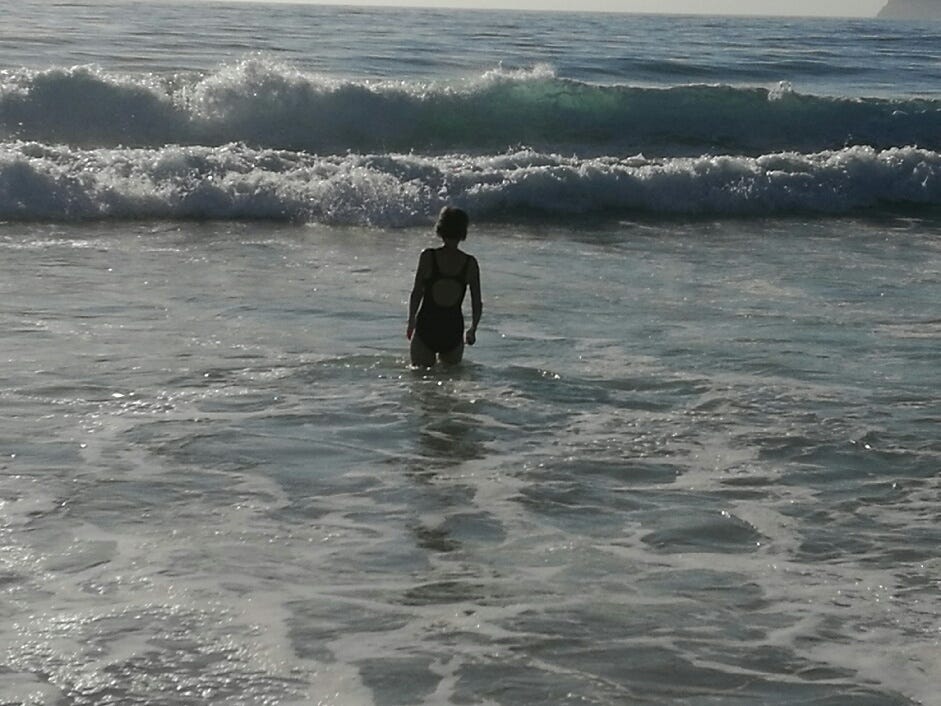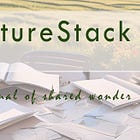🍃 Reciprocity: the interview
6 questions for Sally Gillespie
Nature writer, n. A person who delights in paying attention, being astonished, and telling about it.1
“I often quote Professor Anne Poelina, a Nyikina Warrwa elder, whose response to despairing climate activists who think that the Earth would be better off without humans, is that ‘Earth would be lonely without us.’ This view bestows upon us all roles and responsibilities in maintaining reciprocal relations with Earth. ” ~ Sally Gillespie
Welcome to Season 2 of the Reciprocity interviews. My inbox is full of treasure in the form of lovingly observed writing about place, encounters both wild and gentle, imaginative kinship and renewed reciprocity. These thoughtful, talented writers kindled in me the desire to learn more about them.
Today’s guest, , lives on the unceded traditional lands of the Wangal people of the Eora Nation in Warrane/ Sydney, Australia. She was a Jungian psychotherapist for many years before researching the psychological terrain of climate engagement for her PhD. Her most recent book is Climate Crisis and Consciousness: Reimagining Our World and Ourselves.
Sally’s writing is hopeful and wise, informed by deep study and clear thinking. I always enjoy seeing how she ties together ideas familiar to me with new information and perspectives. You can jump into her work anywhere. Here are a few of my favorites: Whatever the question, community is the answer, Beyond collapse: Carrying stories of care, and Hope? The question I am most often asked.
Psyche’s Nest is a fortnightly Newsletter which celebrates human belonging in our living world, cultivating heart and commitment for ecological care and connection through attention, practices and stories.
Why are you drawn to nature writing?
The first answer is because I love our living world, so reading and writing about this totally delights me. The second answer is that I see nature writing as vital medicine, a personal and cultural healing practice which honours and gives attention to what modernity culture denigrates and denies. Given the existential threats of the climate and ecological emergency we are now in, I believe that to not include nature awareness in any writing is to collude (consciously or unconsciously) with a worldview that is more and more deadly.
What really excites and inspires me is how much nature writing is expanding its parameters into a wide range of writing genres – fiction, nonfiction and everything in between – linking the biological and geological to psychology, politics, spirituality, arts and so much more. All of this contributes to birthing an Earth-centric worldview which finds meaning, wisdom and celebration in protecting and healing ecosystems.
How does writing about nature affect you, in your work or personal life?
Writing about the living world grounds and holds me, as well as gives me a lot of joy. I always start each morning reading some form of nature writing. It’s a great way to begin my day, stirring my attention and appreciation, while also stimulating me to write about my own observations of and relationships with where I live.
For decades I have read and admired nature writing, not daring to think I could be a nature writer until my research into climate psychology opened the door to writing about how paying attention to the beauty of our world and the sacredness of ecosystems are vital forms of soul nourishment and psychological resilience.
Writing Psyche’s Nest on Substack, I have been inspired by the incredible nature writers here to find and shape my own way of contributing to the genre. It’s sparked an exciting chapter in my life focused on strengthening interconnections between writers, writing and world, for which I am very grateful.
While outside, have you ever experienced feeling small, lost or in danger?
I frequently feel small in the largeness of the world and the cosmos beyond. It’s something I consciously seek out as I feel it is good for the soul. One precious memory from my childhood is of lying on our concrete driveway at night, gazing at the stars while my Dad pointed out constellations: the Southern Cross, Orion’s Belt, the Seven Sisters, the Archer. I was entranced by this experience of feeling the hard ground beneath me while my eyes were drawn up into the heavens knowing they were formed by energy, light and speed far beyond my conception or experience.
The mystery and immensity of it all was dizzying and humbling; what significance could my own life have within the time cycles of the cosmos? Attempting that stretch between our contemplations of the Milky Way and the daily concerns of our lives in the suburbs of Auckland, thrilled me, as I know it did Dad who was fascinated by the idea of extra-terrestrial life. As a young adult I studied and practiced astrology, partly I am sure because of this experience of feeling small and yet in some vital way related to the vastness of the heavens.
As for danger, I love swimming in surf. This means I have been dumped and tumbled by powerful waves countless times. Each experience is shocking, reminding me how vulnerable I am within the immense power of the ocean. The last time I was dumped however I felt myself going into an almost calm place of surrender to the wave’s energy, knowing that it would eventually bring me to shore. All I had to do was stay slow and measured in my breathing out. A good lesson to learn for any challenging time in life!

What’s a favorite memory of nature from your childhood?
When I was young, my family regularly holidayed on the shores of Lake Taupō, which lies at the heart of the North Island of Aotearoa, New Zealand. This alpine lake, the size of Singapore, sits beneath three active volcanos Ruapehu, Ngāuruhoe and Tongariro. We would watch the mountains, at times seeing smoke curling up from the craters while all along the lake shore was pumice stone, reminding us that we were on volcanic land. We usually went there in May, when the many poplar trees in the region turned fiery reds and oranges, a sight I could never get enough of. There was such joy too in running through their leaves and rolling in their crunchy golden beauty.
I also remember swimming in the lake’s icy clear waters, feeling so very alive. One day I disappeared off by myself through the bush to sit on a secluded shore and fell into another experience of time and place. When I emerged from this, I felt that I had been let into a secret about the world, but had no words to describe it nor anyone who I could tell. What this experience gifted me was a love and reverence for place, and a belief in a multi-dimensional world which was entirely alien to my atheist family.
What do you hope for, for your writing?
To nurture myself, others and our world through paying attention, marvelling, learning and caring for the life of Earth. Now I am in my sixties, I am thankfully not concerned with career, calling matters much more as does finding companionship through my writing. My greatest hope is to contribute to the cultivation of an Earth-centric culture and worldview which is totally committed to the work of ecological care, respect and reverence. This is a great hope, a smaller and a more achievable hope is to bring warmth into the heart of one reader.
A writer or other creative artist who makes you hopeful for humanity and the earth.
There are so very many, but leading the way for me are First Nations writers and artists who create from a cultural consciousness anchored in respect for life’s infinitude and endurance, and who are steadfast in not giving up on our world or on humanity. Writers like Tyson Yunkaporta, Robin Wall Kimmerer, and Bruce Pascoe come from cultures which have a fundamental belief in humanity’s primary role “to care for Country,” as First Nations people say here in Australia. I often quote Professor Anne Poelina, a Nyikina Warrwa elder, whose response to despairing climate activists who think that the Earth would be better off without humans, is that “Earth would be lonely without us”. This view bestows upon us all roles and responsibilities in maintaining reciprocal relations with Earth.
I am also heartened and inspired by First Nations’ stories of endurance in the face of the (still continuing) horrors of colonisation inflicted upon their peoples and lands, as well as through eras of past climate and geologic disruptions. What I hear in their storytelling is that while the dangers are very real, humans can negotiate enormous challenges and upheavals, when grounded in Earth honouring ways of being and knowing. And that they can do this in ways that nurture spirit and ground culture in love and connection.
Each season, we donate 30% of paid subscriptions to a worthy environmental cause. This season, it’s Indigenous Climate Action, founded in 2015. They envision a world with sovereign and thriving Indigenous Peoples and cultures leading climate justice for all. Their work is grounded in more than just economic solutions, addressing climate from a human rights perspective and uplifting Indigenous voices. Track past and current recipients here.
What did you enjoy most about this interview? I’d love to hear from you. Or share it with others by restacking on Notes, via the Substack app. Thanks!
Notes and links
If you’d like to participate in this interview series, please DM me on chat, or reach out via email: gabrielli-dot-julie-at-gmail. Find previous interviews here.
For more inspired nature writing and artwork from the best of Substack, check out the articles in the latest, and final, NatureStack journal.
In further service to Substack’s nature writers,
curates this lovely directory of nature-focused writers:thanks, Mary Oliver








Beautiful.
Thank you Sally, this brings beauty, hope and inspiration to my morning!